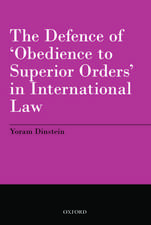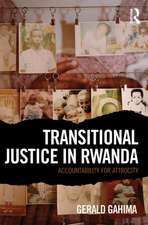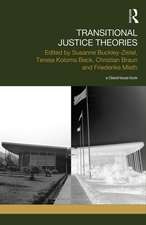Moral Accountability and International Criminal Law: Holding Agents of Atrocity Accountable to the World
Autor Kirsten Fisheren Limba Engleză Paperback – 15 apr 2013
This book is of particular interest to a multidisciplinary academic audience in political science, philosophy, and law, however the book is written in clear jargon-free prose that is intended to render the arguments accessible to the non-specialist reader interested in global justice, human rights and international criminal law.
| Toate formatele și edițiile | Preț | Express |
|---|---|---|
| Paperback (1) | 411.42 lei 6-8 săpt. | |
| Taylor & Francis – 15 apr 2013 | 411.42 lei 6-8 săpt. | |
| Hardback (1) | 1056.00 lei 6-8 săpt. | |
| Taylor & Francis – 29 sep 2011 | 1056.00 lei 6-8 săpt. |
Preț: 411.42 lei
Nou
Puncte Express: 617
Preț estimativ în valută:
78.73€ • 82.40$ • 65.52£
78.73€ • 82.40$ • 65.52£
Carte tipărită la comandă
Livrare economică 01-15 aprilie
Preluare comenzi: 021 569.72.76
Specificații
ISBN-13: 9780415859707
ISBN-10: 0415859700
Pagini: 224
Dimensiuni: 156 x 234 mm
Greutate: 0.34 kg
Ediția:1
Editura: Taylor & Francis
Colecția Routledge
Locul publicării:Oxford, United Kingdom
ISBN-10: 0415859700
Pagini: 224
Dimensiuni: 156 x 234 mm
Greutate: 0.34 kg
Ediția:1
Editura: Taylor & Francis
Colecția Routledge
Locul publicării:Oxford, United Kingdom
Public țintă
PostgraduateCuprins
1. The Distinct Domain of International Criminal Law 2. International Crimes 3. The Expressive Value of Judgement and Punishment 4. Challenges of Individual Responsibility within Collective Wrongs 5. Identifying Liability, Fair Labeling and ICL Offenses 6. Complementarity and the Detriments of Universal Jurisdiction 7. Evaluating Judicial Mechanisms 8. Retributive Justice as Culturally Insensitive? 9. Collective Responsibility and Collective Punishment. Conclusion
Descriere
This book examines international criminal law from a normative perspective and lays out how responsible agents, individuals and the collectives they comprise, ought to be held accountable to the world for the commission of atrocity. The author provides criteria for determining the kinds of actions that should be addressed through international criminal law. Additionally, it asks, and answers, how individual responsibility can be determined in the context of collectively perpetrated political crimes and whether an international criminal justice system can claim universality in a culturally plural world. The book also examines the function of international criminal law and finally considers how the goals and purposes of international law can best be institutionally supported.














